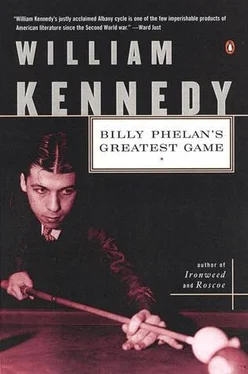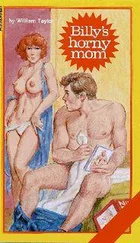“The McCalls got everybody scared to do pee-pee,” Rivera said over his shoulder. “They think they can treat people like dogs.”
“Who’s that guy?” George Quinn asked.
“He’s a bughouse pimp. Gotta be bugs,” Billy said.
Red Tom closed the front door and moved in behind the bar.
“That kind of talk stays out in the street,” he said to all in earshot, looking at no one in particular. He pointed twice toward the door with one finger. “Out in the street,” he said.
When he’d finished his steak, Morrie Berman stood up and announced he was going off to get laid. Billy thought of tagging along with him but rejected the idea. He envisioned Angie in bed up at the Kenmore, waiting. He would go and see her. He was tired of gambling, tired of these people here. Maybe later he could come back and play some blackjack if the game was still running. Do that when he left Angie. If he left Angie. All right, he would see her, then leave her be and come down and play some blackjack. Billy still owed money. First things first.
“I got a date, Martin,” Billy said, pushing away from the table.
“That sounds healthful. Bon voyage.”
“I’ll keep you posted on the bankroll. We’re doing all right.”
“I know we are. You’ve decided not to go along with Patsy’s suggestion?”
“I listened all night. He didn’t say a goddamn thing.”
“What about the Bindy kidnap rumor? He doesn’t seem to remember it, but you do. Isn’t that odd?”
“That don’t mean anything.”
“Are you sure?”
“Aaahh,” Billy said, and he waved off the possibility and went out onto Broadway and turned up Columbia Street, past the old Satin Slipper, a hot place when Butch McHale ran it during Prohibition and now cut up into furnished rooms. He crossed James Street and was halfway to North Pearl when the car pulled alongside him, Bo Linder at the wheel, Jimmy Bergan with him. Billy. Bo. Been looking for you. Oh yeah?
“Bindy wants to talk to you.”
“Bindy? About what?”
“You ask him that.”
“Where is he?”
“Up at Patsy’s house.”
“Patsy who?”
“Patsy who my ass.”
“When’s he want to see me?”
“Two hours ago.”
“If this’s got something to do with Charlie, I don’t know anything.”
“Tell Bindy that. Get in.”
“No thanks.”
“Get in, Billy.”
“You pulling me in? Charging me with something?”
“I can get particular.”
“I’m under arrest, I’ll get in. Otherwise, I’ll take a cab. I know where Pasty lives.”
“All right, take a cab. We’ll follow so the driver don’t get lost.”
Billy walked to Pearl Street and at the corner looked up at the Kenmore, maybe at Angie’s room. She liked the front so she could look down and see people on Pearl Street after she and Billy had loved all possible juices out of one another. Billy didn’t see Angie in any window. She’d be asleep now, wouldn’t go on the town alone. Twelve-thirty now, hell of a time to visit the McCalls.
Two cabs stood in front of the Kenmore. Billy whistled and the front one made a U-turn and Billy got in. Bo Linder was idling at the corner, Bo the cop, a good kid when he was a kid. Good second baseman for The Little Potatoes, Hard to Peel. But what can you do with somebody who grows up to be a mean cop? Never was mean on second base. After he went on the force, Bo walked into Phil Slattery’s joint and shot Phil’s dog when it growled at him. Dog should’ve bit him on the ass.
“Conalee Street,” Billy told the cabbie.
Billy had never learned to pronounce Colonie Street the usual way. But people understood anyway. The driver moved north on Pearl Street, and Bo Linder swung out of Columbia Street and made it a parade.
Billy didn’t hate Colonie Street entirely, for it would have meant hating his mother, his greatest friends, Toddy Dunn, for one, even his ancestors. It would have meant hating the city the Irish had claimed as their own from vantage points of streets like Colonie. It was the street where he was born and had lived until adolescence, when he went off to room by himself. It was the street his sister, Peg, left with their mother when Peg married George Quinn and took a bigger and newer house in the North End.
Billy told the taxi driver to leave him off at the corner of North Pearl, and he walked up the hill toward Patsy McCall’s house. He passed the old Burns house, where the ancient Joe Burns always sat in the window, ten years in the window at least. Old Joe lived with his son, Kid, the sexton of St. Joseph’s Church for years until Father Mooney put him through undertakers’ school; and next door to them the Dillons: Floyd, a conductor on the Central, who put Billy and Peg and their mother in a Pullman with only coach tickets when they went to New York to see the ocean for the first time. Across the street was the vacant lot where the Brothers School used to stand, and next to that the Daugherty house, gone, and then the other house: That house Billy did not now look at directly but saw always in his memory and hated, truly did hate that much of the old street.
And it was an old street even when Billy was born on it. It ran westward along the river flats from the Basin, that sheltered harbor that formed the mouth of the Erie Canal, and rose up the northernmost of the three steep ridges on which Albany was built: Arbor Hill. It rose for half a mile, crossed Ten Broeck, the street where the lumber barons had built their brownstones, and, still rising, ran another half mile westward to all but bump the Dudley Observatory, where scientific men of the city catalogued the stars (8241 measured and recorded for the International Catalogue as of 1883) from the top of the same hill on which Mike Mulvaney grazed and daily counted his two dozen goats.
The street took its name from The Colonie itself, that vast medieval demesne colonized in 1630 by an Amsterdam pearl merchant named Kiliaen Van Rensselaer, who was also known as the First Patroon, the absentee landlord who bought from five tribes of Indians some seven hundred thousand acres of land, twenty-four miles long and forty-eight miles wide, out of which a modest seven thousand acres would eventually be expropriated by the subsequent Yankee overlords to create the city of Albany.
Each power-wielding descendant of Van Rensselaer to assume the feudal mantle of the Patroonship during the next two centuries would maintain exploitative supremacy over thousands of farm renters on the enormous manor called, first, Rensselaerswyck, and later, The Colonie. Each Patroon would make his home in the Manor House, which rose handsomely out of a riverside meadow just north of the city on the bank of a stream that is still called Patroon Creek. Mickey McManus from Van Woert Street went rabbit hunting one day near The Patroon’s creek and shot a cow. Few can now remember that meadow or even where the Manor House stood precisely. It closed forever in 1875, when the widow of the Last Patroon died there, and it was later moved to make room for the Delaware and Hudson railroad tracks, dismantled brick by brick and reassembled in Williamstown as a fraternity house.
But long before that, North Albany, where Billy Phelan and Martin Daugherty both now lived, and Arbor Hill, where the McCalls and Billy’s aunts and uncles still lived, had been seeded in part with the homes of settlers who worked as servants and as farm and field hands for the Patroon. Billy Phelan’s great-grandfather, Johnny Phelan, a notably belligerent under-sheriff, was given the safekeeping of the Manor House as his personal charge after four rebellious prisoners barricaded themselves in their cell at the penitentiary and, with a stolen keg of gunpowder, threatened to blow themselves up unless the food improved. Johnny Phelan sneaked a fire hose to the door of their cell, opened the door suddenly, and drenched their powder with a swift blast. Then he leaped over their barricade and clubbed them one by one into civility.
Читать дальше












